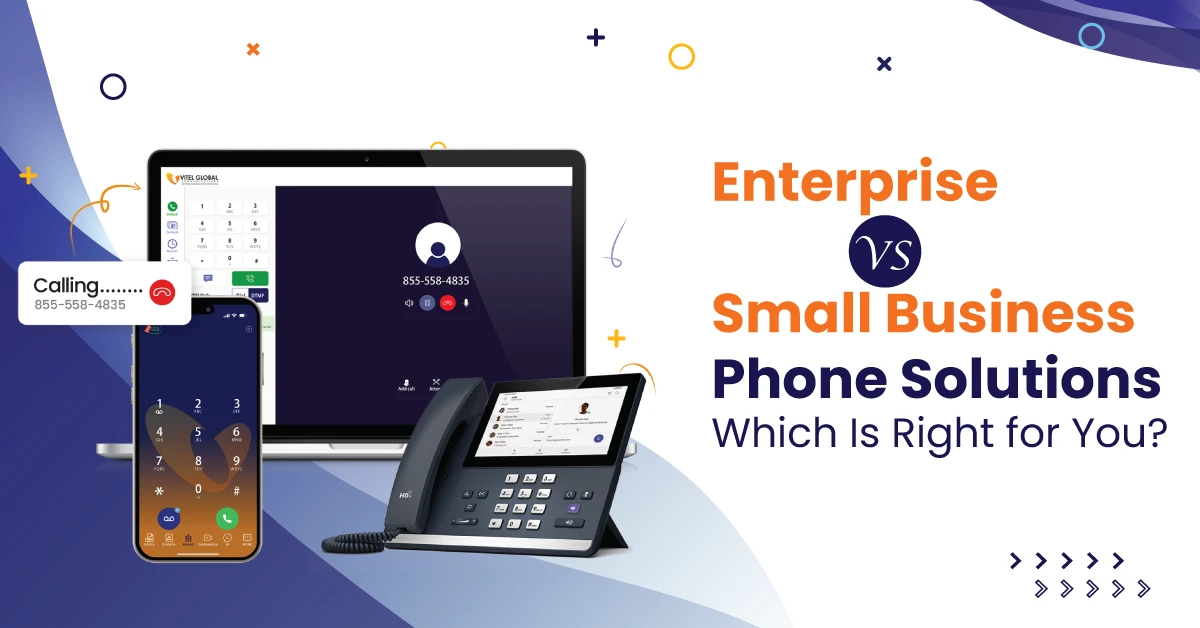Enterprise vs Small Business Phone Solutions: Which Is Right for You?

6 min read
Introduction to Business Phone Systems
- Business phone systems are a crucial component of any organization’s communication infrastructure, providing a range of features and functionalities to support efficient and effective communication.
- Small business phone systems and enterprise phone solutions cater to different needs, with the former focusing on simplicity and cost-effectiveness, and the latter emphasizing scalability and advanced features.
- VoIP phone systems have become increasingly popular, offering internet protocol-based communication that can be easily integrated with mobile and desktop apps.
- When choosing a business phone system, it’s essential to consider factors such as cost, scalability, security, and features, including unlimited domestic calling, international calling, and video conferencing.
Business phone systems are the backbone of modern business communications, enabling teams to connect internally and externally with clients, partners, and customers. The right phone system not only facilitates voice calls but also integrates with other communication channels and business tools, enhancing productivity and customer service. As businesses evolve, their communication needs become more complex, making it vital to select a system that aligns with their current and future requirements. Explore how Vitel Global’s cloud communication solutions can empower your business with seamless connectivity and advanced features. Request a free demo today to see the difference.
Types of Business Phone Systems
- Traditional phone systems rely on physical infrastructure, while cloud-based phone systems offer greater flexibility and cost savings.
- VoIP phone systems use internet protocol to transmit voice calls, providing a range of benefits, including lower costs and increased mobility.
- Small business phone systems often prioritize ease of use and affordability, while enterprise solutions focus on advanced features and customization.
- Key considerations when selecting a phone system include the number of users, call volume, and required features, such as call forwarding, auto attendants, and team chat.
Traditional phone systems, often known as Private Branch Exchange (PBX), require on-premises hardware and dedicated phone lines, which can be costly to install and maintain.
In contrast, cloud-based phone systems leverage internet connectivity to deliver voice and data services, eliminating the need for extensive physical infrastructure. VoIP technology has revolutionized business communications by enabling voice calls over the internet, which reduces costs and supports a mobile workforce.
Small business phone systems typically offer straightforward setups and essential features, while enterprise solutions provide complex configurations, integration capabilities, and enhanced security measures to meet high call volumes and diverse communication needs. Discover how Vitel Global’s scalable VoIP solutions can adapt to your business size and needs. Contact our sales team to learn more.
Business Phone Service Providers
- Reputable providers offer a range of plans and features, including unlimited calling, video meetings, and mobile apps.
- Small businesses may prefer providers with simple, affordable plans, while enterprises require more comprehensive solutions with advanced features and custom pricing.
- Top business phone service providers include those offering VoIP services, traditional phone systems, and hybrid solutions.
- When evaluating providers, consider factors such as customer support, reliability, and security, as well as the quality of their phone equipment and internet connection.
Choosing the right business phone service provider is critical to ensuring reliable and secure communications. Providers vary widely in their offerings, from basic plans suitable for startups to feature-rich packages designed for large enterprises.
Features such as unified communications, which combine voice, video, messaging, and collaboration tools into one platform, are increasingly important for businesses aiming to streamline workflows. Additionally, integration with popular software like Google Workspace and customer relationship management (CRM) systems can enhance operational efficiency.
It’s also important to assess the provider’s customer support responsiveness and the robustness of their network infrastructure to minimize downtime and call quality issues. Vitel Global offers industry-leading cloud communication services backed by expert support. Upgrade your phone system now and experience unmatched reliability.
Features and Functionality
- Advanced features such as call recording, virtual faxing, and custom plans can enhance business communications and productivity.
- Small business phone systems often include basic features such as voicemail, call forwarding, and team messaging, while enterprise solutions offer more advanced functionalities.
- Video conferencing and screen sharing are essential features for remote teams and customer service teams.
- Consider the importance of features such as auto attendants, ring groups, and custom pricing when selecting a phone system.
Modern business phone systems come equipped with a wide array of features designed to improve communication and collaboration. Call recording helps with quality control and training, while virtual faxing allows businesses to send and receive faxes digitally, reducing paper use. Auto attendants and ring groups help manage high call volumes efficiently by directing callers to the appropriate departments or personnel. Video conferencing and screen sharing capabilities support remote work and customer interactions, making them indispensable in today’s business environment. Enterprises often require customizable plans to tailor features and user permissions according to their organizational structure, whereas small businesses benefit from user-friendly interfaces and essential communication tools. Explore Vitel Global’s feature-rich VoIP phone systems tailored to your business needs. Request your personalized demo today.
Cost and Pricing
- The cost of a business phone system can vary widely, depending on the provider, plan, and features.
- Small businesses may prefer affordable, basic plans, while enterprises require more comprehensive solutions with custom pricing.
- VoIP phone systems can offer significant cost savings, especially for businesses with high call volumes or international calls.
- Consider the total cost of ownership, including monthly costs, equipment expenses, and any additional fees for features such as toll-free numbers or premium features.
Cost considerations are paramount when selecting a business phone system. Small businesses often seek plans that offer essential features at a lower monthly cost, with options to scale as they grow. Enterprises typically negotiate custom pricing to accommodate their complex needs, including advanced security, extensive integrations, and high-capacity call handling.
VoIP systems generally reduce expenses by eliminating traditional phone lines and enabling unlimited domestic and international calling. However, businesses should also factor in potential costs for hardware, installation, training, and ongoing support to accurately assess the total cost of ownership.
Vitel Global provides transparent pricing with flexible plans designed to maximize cost savings without compromising features.
Scalability and Security
- Scalability is critical for growing businesses, which require phone systems that can adapt to increasing demand.
- Security is also essential, with features such as encryption and secure authentication protecting business communications.
- Cloud-based phone systems offer greater scalability and security than traditional systems, with automatic updates and redundant infrastructure.
- Consider the importance of features such as visual voicemail, voicemail to email, and quality control when evaluating the security and scalability of a phone system.
Scalability ensures that a phone system can accommodate business growth without requiring a complete overhaul. Cloud-based VoIP solutions allow companies to add or remove users and features quickly, supporting seasonal fluctuations and expansion. Security measures such as end-to-end encryption, multi-factor authentication, and compliance with regulatory standards safeguard sensitive communications from cyber threats. Features like visual voicemail and voicemail to email improve accessibility and response times, enhancing overall communication effectiveness. Quality control tools, including call monitoring and analytics, help maintain high service standards and identify areas for improvement. Secure your communications with Vitel Global’s scalable and secure cloud phone systems.
Conclusion
- When choosing between enterprise and small business phone solutions, consider factors such as cost, scalability, security, and features.
- VoIP phone systems offer a range of benefits, including cost savings, increased mobility, and advanced features.
- Small businesses prioritize simplicity and affordability, while enterprises require more comprehensive solutions with custom pricing and advanced features.
- Ultimately, the right phone system will depend on the specific needs and goals of your business, including the importance of features such as video conferencing, team chat, and customer relationship management.
Selecting the ideal business phone system requires a thorough understanding of your organization’s communication needs and future plans. While small businesses benefit from straightforward, cost-effective solutions that cover essential features, enterprises demand robust, scalable systems with extensive customization and integration capabilities.
VoIP technology bridges these needs by providing flexible, feature-rich platforms that support diverse communication channels. By carefully evaluating providers, plans, and functionalities, businesses can invest in a phone system that enhances collaboration, improves customer experiences, and supports growth.
Discover how Vitel Global can be your trusted partner in business communications.
Frequently Asked Questions (FAQs)
1. What is the difference between enterprise and small business phone solutions?
Enterprise phone solutions are designed for large organizations with high call volumes and complex communication needs. They offer advanced features, scalability, and customization. Small business phone systems focus on simplicity, affordability, and ease of use, catering to smaller teams with less complex requirements.
2. Are VoIP phone systems suitable for both enterprises and small businesses?
Yes, VoIP phone systems are versatile and can be tailored to fit both small business and enterprise needs. They provide cost savings, mobility, and advanced features that scale according to the size and requirements of the organization.
3. Can I use my own device with a business phone system?
Many business phone systems support Bring Your Own Device (BYOD) policies, allowing employees to use their own mobile phones, laptops, or tablets to make and receive calls through mobile and desktop apps.
4. What features should I look for in a small business phone system?
Key features include unlimited domestic calling, call forwarding, voicemail to email, team messaging, video conferencing, and integration with customer relationship management (CRM) tools.
5. How does scalability affect my choice of phone system?
Scalability ensures your phone system can grow with your business. Cloud-based VoIP solutions typically offer easy scalability, allowing you to add or remove users and features as needed without significant upfront costs.
6. What are the security considerations for business phone systems?
Look for systems that offer encryption, secure authentication, and compliance with industry standards to protect your business communications from cyber threats.
7. Do business phone systems support text messaging and business SMS?
Yes, many modern business phone systems include text messaging and business SMS capabilities, enabling seamless communication with customers and remote employees.
8. How important is reliable internet for VoIP phone systems?
A reliable internet connection is critical for VoIP phone systems to ensure clear voice calls, prevent dropped calls, and maintain overall call quality.
9. Can I forward calls to mobile phones or other devices?
Yes, most business phone systems allow call forwarding to mobile devices, desk phones, or virtual phone numbers, ensuring you never miss inbound calls.
10. What is the typical cost range for a business phone system plan?
Costs vary based on features and number of users but generally range from $10 to $75 per user per month. Enterprises may have custom pricing based on their specific needs. Ready to upgrade your communication infrastructure? Contact Vitel Global today to find the perfect plan for your business.
Published: September 22nd, 2025
Subscribe to Our Latest Updates
Get monthly product and feature updates, the latest industry news, and more!


